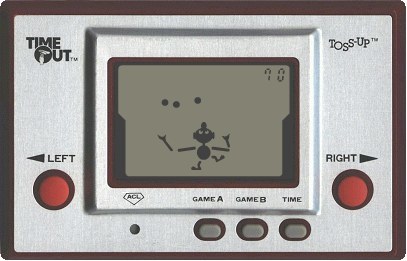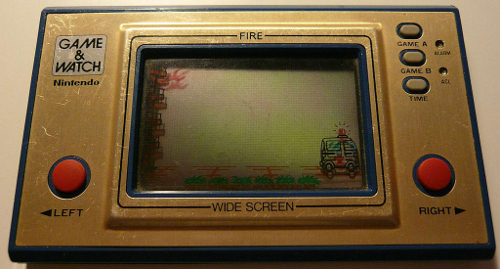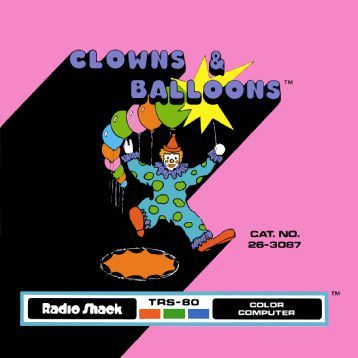My first thought was how much this looked like 3-frame LCD games. 
I’ve seen this, as well. In fact, I’ve plunged out a bonus ball because the TD didn’t specify this case beforehand and I made the mistake of asking my competitor and he told me to plunge it out. However, I think I was about a million behind, so didn’t have much of a chance. Still…
[quote=“Brian, post:27, topic:2227, full:true”]If Stern’s code was open sourced then it would be easier to analyze things like this. I just don’t see Stern open sourcing any of their code for the greater good.
[/quote]
It’d be easier, but not impossible. The game code in EarthBound is one of the most secure ones ever made for a video game (though some of that is because of the absurd complexity of its engine), yet that’s been data-mined for everything it’s worth.
Consider also the HD-DVD incident. The MPAA spent US$1 billion on encrypting it, but it was cracked within a month. What it takes is at least one very dedicated person to do it.
I was thinking specifically of Fire.

As was I! It seems like a direct homage!
I guess what I’m trying to say is that I don’t want people to crack the code as much as I’d like to see Stern give something back to the community by open sourcing their code, opening up APIs and allowing people to build upon it.
For example, you know they probably still have the source code to Meteor somewhere but what’s the point of still keeping the code to a 1979 machine close sourced? If they opened it and others up, it would allow people to do pretty cool things.
These are good reasons why the simplest rule is to play all turns. If the rule is “play your turn” there’s nothing to argue or be confused about. I sometimes get asked what the PAAP/IFPA rule is about plunging extra balls: there isn’t one.
Rules limiting extra balls exist for the sake of saving time at locations where they can’t be shut off.
Here is the one I was thinking of.

Because that was a totally different company that made meteor.
It really should have been a cow bonus instead 
This came up at IFPA… can somebody PLEASE figure out all the conditions of pity LARD in Family Guy?
Word on the street is it has to with score (under 10 mil?), game time (2 mins?), game features (multiball, ??), possibly even switch hits…
They probably don’t have the source to meteor since as Keith points out that was a different company, but that doesn’t mean that someone hasn’t recreated it. Of course, reverse engineering source code with hopefully relevant comments is not as good as having the original source code, but it still ‘works’ for modification/instructional purposes.
Pity Lard was discussed earlier. Scroll up: http://www.tiltforums.com/t/how-come-i-dont-see-much-data-mining-for-pinball/2227/14?u=wizcat
One that entrigues me, is the Fish Tales videomode “BS” (big score). It is highly significant on your good ol’ beasty FT in competition. I will dig that one out some day, and promise to share it with you.
Although, my guess is that it is linked to some over/under evaluation of the extra ball percentage. Just that EB = BS, if and when the max EB for the game is reached. Which reminds me…
It is good practise to clear audits / factory reset games for tournaments. Notably for games that are not kept in permanent competition configuration.
PS. And stop calling it data-mining, eh.
I know for a fact that some of those are wrong… For instance, I had a game where I started two modes, 6.4 million, still got pity lard. @timballs knows the real answers…
Not quite what you’re talking about, but in respect to tournaments, there is a lot of good player data made available in Karl’s Drains Tournament Manager. Last year at Pinvasion, I used my top B qualifier pick privilege, and the data that was available there to win B division. I analyzed every opponent’s qualifying history to develop a strategy and it played out perfectly.
As much as I loathe the term in this context (software disassembly), I think that ship has already sailed. The term gets abused to an absurd degree in gaming circles.
It’s more fun to watch people guess every time it appears in a tournament
What I’m referring to is looking at the game code itself and finding out particular specific details that can help give you the edge over someone who isn’t privy to that information. This is not in relation to data about the players, but about the game itself.
I used Pokémon games as an example of a game series that gets data-mined to smithereens, whose data is then analyzed and revealed to anyone who wishes to see them, on sites such as Serebii.net and Bulbapedia. Both of these sites (as well as Psypoke, Poké Beach, and other such Pokémon data sites) have their own team of data-miners who will pick apart every last detail of the game’s code that they can find, and they uncover stuff like what I mentioned above, game mechanics and details that you cannot possibly know just by playing the games.
Here’s a prime example:

This is Darkrai. When Pokémon Diamond and Pearl came out, you weren’t supposed to know about it yet, because there was no way to obtain Darkrai. However, because Darkrai’s full data was in the game code, not only did most Pokémon fans find out about Darkrai the day Pokémon Diamond and Pearl came out (the data-miners for Pokémon are THAT FAST) Darkrai would become officially obtainable 2 years later, but by then, everybody who wanted Darkrai already knew about it, and people who wanted to use Darkrai already had planned out what to do with Darkrai once they received it.
That is, what I was always wondering about was why pinball players are always asking “How many points is A worth?” or “What are the rules to B?” when someone could just go scan through the game’s code and find out. This sort of data-mining is quite common in video game circles. Instead, I got the impression pinball players try to figure out these questions by playing the games and through trial and error. I understand that not everybody would want to know all of this like that, but I figured at least SOME people would, and I figured going through the game code directly would give you some concrete, irrefutable answers rather than doing guesswork and inference playing the game.
Sorry, but that’s the term I see used in every video game community I’ve been in (and with the exception of some very low-profile indie games here and there, I’ve never found one that DIDN’T have people examining the code and finding things). What should be the correct term then? (It’s software disassembly?)
It’s been called ‘hacking’ forever.